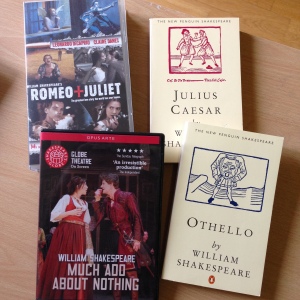I’d originally planned to write this post on Thursday, but I’ve been a bit poorly this week. Nothing serious, but enough that I’ve found myself spending a lot of time sitting on the sofa, trying and failing to summon the energy to do anything productive. (The other night, I ended up watching a whole episode of Brooklyn Nine Nine – which, I’m sorry, is clearly just Scrubs with cops – because it was too much effort to reach for the remote after The Big Bang Theory, and even tougher to actually get up and go to bed.)
Anyway, apparently nobody’s really sure when Shakespeare’s birthday actually was, so I’m sure he won’t mind that I’m a bit late with this post.
I think what I enjoy most about Shakespeare’s work is its timelessness. I doubt there’s any other writer whose work has been adapted so many times and in so many ways, on stage and screen. His plays deals with so many human themes and emotions – love, jealousy, grief, ambition – that we’ll always be able to relate to them. A bit like Friends.
So even though the language might take a bit of getting used to, and some of the stories may be slightly implausible (no, putting on a wig doesn’t instantly make a girl look like a boy), I do believe there’s something in there that speaks to everyone.
In case there was any doubt, here are the Shakespeare plays I have tickets for over the next eight months: Much Ado About Nothing, Julius Caesar, The Merchant of Venice, The Taming of the Shrew, Two Gentlemen of Verona and The Winter’s Tale (with Dame Judi and Sir Kenneth – squeal!). I’m also still extremely tempted to see Romeo and Juliet too – and not only because Robb Stark’s in it…
So, in celebration of Mr Shakespeare’s birthday, here are ten of his best quotes. There were a lot to choose from, but these are ones that I feel are particularly inspiring; I hope you do, too. And please share your own favourite Shakespeare quotes, as I’m sure I missed plenty of great ones!
“Our doubts are traitors, and make us lose the good we oft might win, by fearing to attempt.” – Measure for Measure, Act I, Scene 4
“The worst is not, So long as we can say, ‘This is the worst.’ ” – King Lear, Act IV, Scene 1
“The robbed that smiles steals something from the thief.” – Othello, Act I, Scene 3
“Everyone can master a grief but he that has it.” – Much Ado About Nothing, Act III, Scene 2
“What’s gone and what’s past help should be past grief.” – The Winter’s Tale, Act III, Scene 2
“Better a witty fool than a foolish wit.” Twelfth Night, Act I, Scene 5
“How far that little candle throws its beams! So shines a good deed in a naughty world.” The Merchant of Venice, Act V, Scene 1
“This above all: to thine own self be true.” Hamlet, Act I, Scene 3
“‘Tis not enough to help the feeble up, but to support them after.” Timon of Athens, Act I, Scene 1
“A friend should bear his friend’s infirmities.” – Julius Caesar, Act IV, Scene 3

